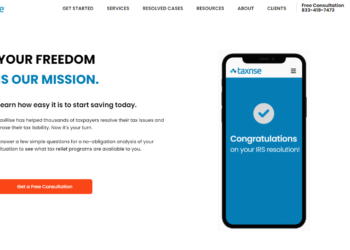Tax debt is a difficult thing to handle, especially if you are dealing with it on your own. And when tax collectors are after you for unfiled or delinquent returns, it can make your situation even more difficult. The Internal Revenue Service (IRS) continues to update and complicate tax laws on a yearly basis which makes it very difficult for the average taxpayer to successfully defend themselves. Tax debt quickly becomes a hole that you seemingly can’t climb out of, particularly when you’re feeling pressure from the IRS, but there are many solutions that may simplify your situation. The most effective way is to familiarize yourself with IRS tax laws via a tax professional and to do this, you should seek out help from a tax relief company. These companies ensure that the IRS sticks to its own Taxpayer Bill of Rights and curbs the threat of the IRS to help you sort out your financial life again.
Types of tax professionals
The IRS generally has little to no sympathy to delinquent taxpayers regardless of financial situations or excuses which is contrary to the treatment you will receive by most tax relief companies.
When looking for a tax relief company, be sure to find one that has caring and qualified tax professionals. Enrolled agents are licensed tax professionals. They possess the highest credential awarded by the IRS and are able to represent any taxpayer before the IRS, regardless of the taxpayer’s situation. Certified public accountants (CPAs) and tax attorneys are also authorized to represent clients before the IRS. But unlike tax professionals who are regulated on the federal level, CPAs and tax attorneys are regulated on the state level. CPAs cover a variety of accounting needs while tax attorneys focus on tax law and can represent clients in court.
Types of tax problems
It is wise for potential tax relief customers to research types of tax liabilities and IRS problems that different companies resolve. Some companies specialize in tax resolution services while others represent clients during tax audits. So don’t simply choose the first tax relief company you find; do some research and find a company that is well suited to your specific situation and tax issues. Here are some of the most common tax issues that tax relief companies work with:
- Tax levy—The IRS’ legal right to seize property for unpaid taxes. Tax levies represent a more drastic measure than tax liens.
- Back taxes—Unpaid taxes which have likely accrued penalties over the course of time since their due date. These taxes involve the most common form of tax debt because oftentimes the taxpayer does not currently have the money to pay back taxes.
- Tax liens—A tax lien involves a public notice declaring the IRS’ right to claim earnings before other creditors when a piece of property is sold. Taxpayers have several options to get rid of a tax lien through tax relief companies.
- Tax audit—An IRS tax audit involves the IRS’ decision to look more closely at your tax return in order to discover discrepancies and inaccuracies.
- Wage garnishment—The IRS collects owed taxes directly from a taxpayer’s paycheck.
- Other issues—Most tax relief companies may also assist with innocent spouse relief, bookkeeping, and business taxes.
Types of tax solutions
Because of complex tax law, code, and regulations, most taxpayers aren’t aware of the many potential solutions when it comes to common tax debt issues. Tax relief companies should have multiple solutions to any of your possible tax debt problems. Here is an overview of some of the solutions to common tax debt issues:
- Installment agreement—This allows the taxpayer to set up a payment plan to the IRS. Through this plan, they will pay their owed taxes in monthly payments over a period of time. This can be in the form of a traditional installment, streamline, or partial pay agreement. Since installment agreements are easiest to negotiate with the IRS, they are the most common.
- Offer in compromise—An offer in compromise lets taxpayers settle with the IRS for less than they owe. This is only granted if the taxpayer is unable to pay the full amount. The taxpayer must also prove their inability to pay.
- Currently not collectible status—If you and the IRS both agree that you owe taxes and you cannot pay the full amount owed, you are able to classify your account as Currently Not Collectible (CNC). When you qualify for CNC, you will need to provide a variety of documents. These include pay stubs of recent or current jobs, monthly income statements, recent mortgage/lease statements, utility bill details, recent credit card statements, property tax bills for vehicles owned, proof expenses, and proof of assets.
- Penalty abatement—Your penalties can be reduced or removed if you qualify for penalty abatement. If you think you have unfairly been penalized by the IRS, you are required to prove you had reasonable cause for filing late or not filing at all in order to qualify. In a situation in which first-time tax debtors request a reduction of some or all tax penalties, the taxpayer may apply for a first-time abatement (FTA). Other reasons for abatement requests include IRS errors and bad advice from the IRS.
- Audit defense—When the IRS suspects discrepancies in your tax return, they will perform an audit. You are legally allowed to add Audit Defense to the IRS auditing process, meaning that you would have a tax professional representing you during the audit.
- IRS appeals—When a taxpayer doesn’t agree with IRS findings or penalties, he or she can file an appeal with IRS Appeals Office.
- Innocent spouse relief—If your current or past spouse filled out a tax return incorrectly, it’s possible for both of you to be penalized, but you may qualify for Innocent Spouse Relief which, depending on the circumstances, may waive your responsibility to pay the debt.
Accreditations
Something important to consider is whether each company’s tax professionals are involved with accreditation organizations like the National Association of Enrolled Agents (NAEA). This provides tax professionals with training and other opportunities as well as signifies that the professionals are held to high standards. Other national organizations like the National Association of Tax Professionals (NATP) and the American Society of Tax Problem Solvers (ASTPS) provide more opportunities for training and regulate industry standards.
Due to the fact that every state has differing tax standards and laws, it is crucial that tax relief companies are aware of the state laws that affect your specific tax debt situation. State-specific organizations provide tax law training that is specific to their state to tax professionals.
Tax Relief Frequently Asked Questions
Can I represent myself before the IRS?
Yes. This is essentially what occurs when a taxpayer does not hire a tax relief company to represent themselves against the IRS. However, there are significant advantages to hiring a tax relief company to represent you. Just like you would rather have a lawyer represent you against a judge, a tax relief specialist will be your best defense against the IRS. Even cases in which the taxpayer will lose regardless, tax relief companies can still reduce or eliminate some of the debt that is owed.
Can companies help me with state and federal taxes?
Most tax relief companies are able to help with federal taxes; however, only some may offer state tax relief. This depends on where you live, so check with each company to find out whether they are members of your state’s tax accreditations.
How much will tax resolution cost?
The average price of a comprehensive tax relief service has been reported to be around $2,500-$4,000. However, it’s not impossible to find a company that charges as low as $500. But most tax relief companies do not disclose prices upfront, so these ranges may vary. Please be aware of scammers as you research tax relief companies. A company offering significantly lower prices may be a scam in disguise. Make sure you can verify the authenticity of a desired tax relief company through a trusted source.
Can tax relief companies really save me thousands of dollars?
Yes. Many tax relief companies hire licensed tax professionals who have either worked with or for the IRS in the past. Tax professionals can eliminate debts or at least reduce tax debts to a feasible amount. Tax relief companies often eliminate or lower the interest and penalties you need to pay. To get a better understanding of how much you can save, consider contacting a tax relief representative. Many reputable companies offer free consultations for possible clients.
How does the tax resolution process work?
The first part of the process is likely a free phone or in-person consultation from the tax resolution company you prefer. This will give you an idea of what they can do about your specific tax debt situation. The professionals will assess your situation and come to you with a plan before you make a commitment. When you choose to work with your ideal tax company, you will be given a representative to work with. They will assess your tax documents and have the ability to present your case before the IRS. Once the representative contacts the IRS to get the extent of information of your tax debt, they will analyze the information, and prepare a report for you as their plan of action.
How do I know if I qualify for tax relief?
There are varying levels of tax relief. You will know which ones you qualify for depending on your level of tax debt. The point of free tax relief consultations is to verify the levels of tax relief you qualify for.
How do I know if a tax relief company is legitimate?
To check if a tax relief company is legitimate, read over positive and negative customer reviews and check the company and employee accreditations. If the company employs members of the NATP, ASTPS, NAEA, or other tax relief accreditations, you will be sure to have a quality tax relief expert to work with. Furthermore, you should verify that the company employs tax professionals like CPAs, enrolled agents, and tax attorneys.
Will the company represent me before the IRS?
Yes, enrolled agents have full legal authority to represent you before the IRS. Other types of professionals like CPAs or tax attorneys may have some limited authority to represent you, however. If a tax company does not have enrolled agents or at least CPAs, that is a red flag regarding the company itself.
Final Words
If you are struggling with tax debt contact a tax relief company for a free consultation. They are knowledgeable of all the relevant laws and tax solutions, experienced in dealing with the IRS, and can help set you in the right direction in terms of the next steps for your tax resolution. Feel free to shop around different tax relief companies before making your final decision, so you can ensure that you are working with a reputable company.



















